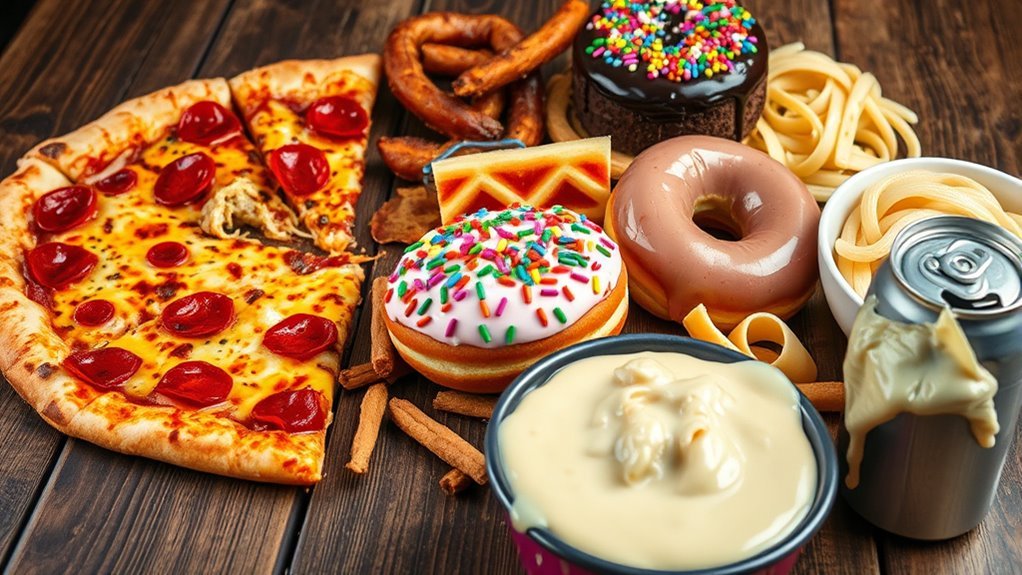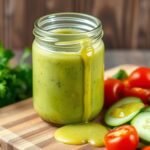To maintain a ketogenic diet, you need to avoid sugary foods and beverages, grains, starchy vegetables, high-carb fruits, and legumes. Processed items usually contain hidden sugars and unhealthy ingredients that derail your goals. Be cautious with low-fat products, as they’re often loaded with added sugars. Certain condiments like ketchup and sweet dressings should also be avoided. Finally, many alcoholic beverages can be high in carbs. There’s more to understand, so keep exploring for deeper insights.
Sugary Foods and Beverages
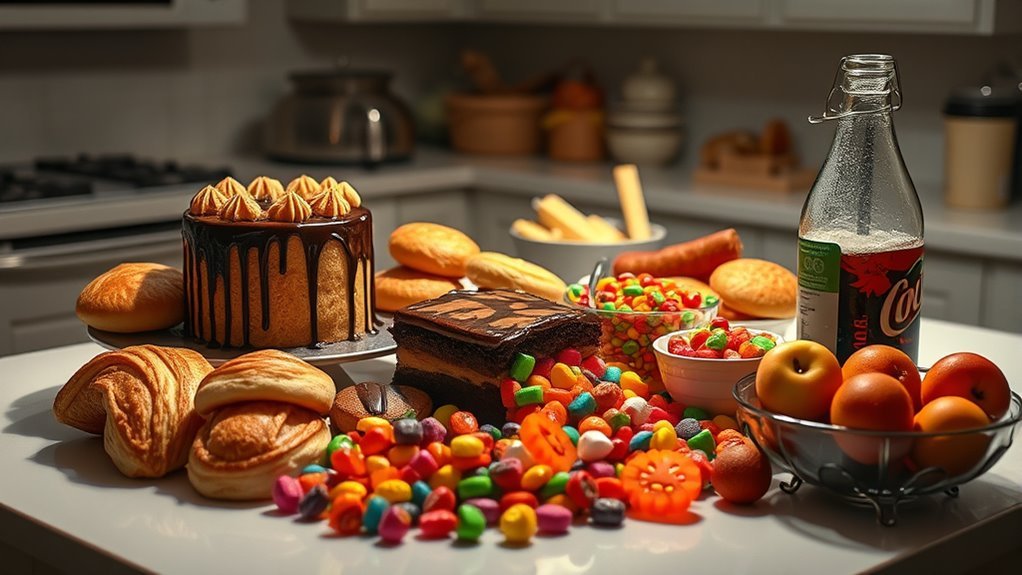
When you’re following a keto diet, it’s essential to steer clear of sugary foods and beverages, as they can quickly derail your progress. Consuming high amounts of sugar spikes your insulin levels, making it harder to enter ketosis. Instead, consider sugar substitutes like stevia or erythritol, which provide sweetness without the carbs. When making beverage choices, opt for water, unsweetened tea, or black coffee. These drinks won’t affect your carb intake and can keep you hydrated. If you’re craving something fizzy, many brands offer zero-calorie sodas sweetened with sugar substitutes. Remember, being mindful of your choices empowers you to enjoy a fulfilling keto lifestyle without the burden of sugar. Prioritize these alternatives to maintain your freedom on this journey.
Grains and Starches
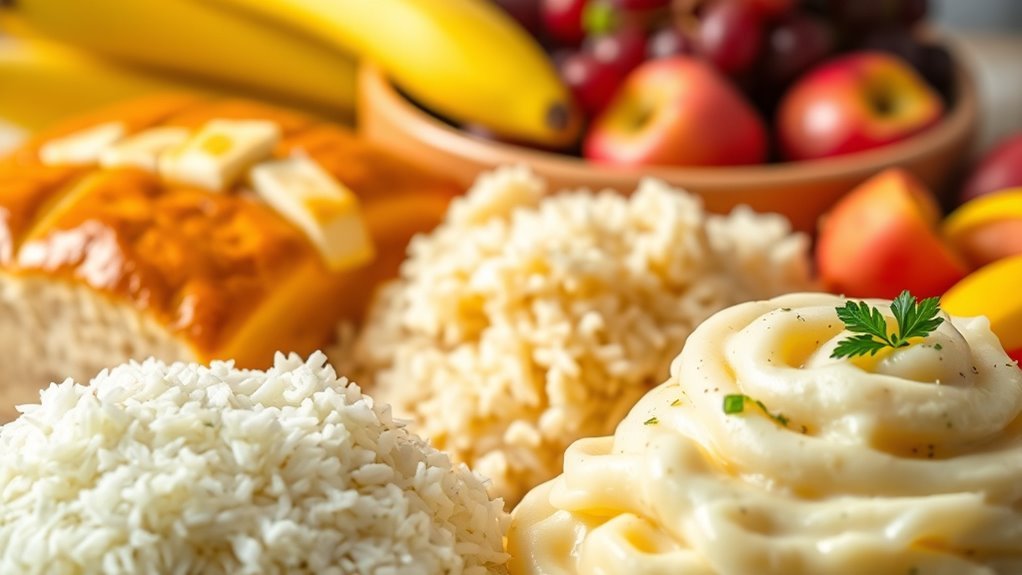
When following a keto diet, it’s essential to steer clear of high-carb grains and starchy vegetables, as they can sabotage your progress. Foods like bread and pasta not only pack on carbs but can also lead to cravings and blood sugar spikes. Understanding which grains and starches to avoid will help you stay within your carb limits and achieve your health goals.
High-Carb Grains to Avoid
While following a ketogenic diet, it’s crucial to steer clear of high-carb grains and starches that can sabotage your progress. Consuming these foods can lead to spikes in blood sugar, making it harder to maintain ketosis. Instead of high-carb options, consider gluten free grains or whole grain alternatives that fit within your carb limits.
Here’s a quick reference table for grains to avoid:
| High-Carb Grains | Carbohydrate Content (per 100g) |
|---|---|
| Wheat Flour | 76g |
| Rice | 28g |
| Quinoa | 21g |
| Oats | 66g |
Starchy Vegetables Limitations
In addition to high-carb grains, starchy vegetables can also hinder your ketogenic journey. Common starchy vegetable types like potatoes, corn, and peas pack in more carbs than you’d want on a keto diet. These carbs can quickly push you out of ketosis, limiting your body’s ability to burn fat for fuel. It’s important to be mindful of how you prepare these vegetables, too; methods like boiling or frying can further enhance their carb content. Instead, focus on lower-carb options like leafy greens or cruciferous veggies prepared through steaming or roasting. By understanding the limitations of starchy vegetables, you can make better choices that align with your keto goals and enjoy the freedom of a healthier lifestyle.
Bread and Pasta Risks
Many people don’t realize just how detrimental bread and pasta can be to a ketogenic diet. These grains and starches are packed with carbohydrates, which can kick you out of ketosis and stall your progress. Instead of traditional options, consider keto alternatives like zucchini noodles or almond flour bread.
| Food Item | Carbs (per serving) | Keto Alternative |
|---|---|---|
| White Bread | 15g | Almond Flour Bread |
| Spaghetti | 43g | Zucchini Noodles |
| Fettuccine | 45g | Shirataki Noodles |
High-Carb Fruits
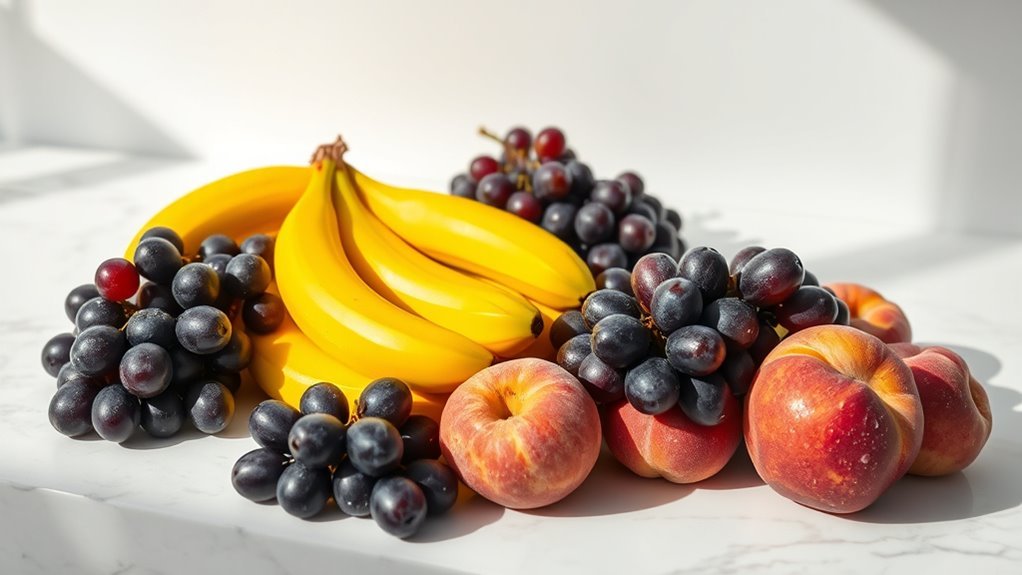
When following a ketogenic diet, it’s crucial to be mindful of the fruits you choose, as some can markedly impact your carb intake. High-carb fruits, especially tropical varieties like bananas, pineapples, and mangoes, can quickly add up in carbohydrates. These fruits often contain sugars that can spike your blood sugar levels, pulling you out of ketosis. Instead of reaching for these high-carb snacks, consider low-carb options such as berries, which are lower in sugar and can fit into your keto lifestyle. Remember, moderation is key. While fruits can offer vitamins and minerals, prioritizing lower-carb choices guarantees you maintain the freedom and benefits of a successful ketogenic diet. So, choose wisely and enjoy the journey!
Legumes
When following a keto diet, you’ll want to steer clear of legumes due to their high carbohydrate content, which can hinder your progress. While they’re packed with nutrients, there are plenty of lower-carb alternatives that can fit your meal plan. Consuming legumes can impact your state of ketosis, making it essential to choose your foods wisely.
High Carb Content
Although legumes are often praised for their nutritional benefits, they can pose a significant challenge for those following a ketogenic diet due to their high carbohydrate content. When meal planning, it’s crucial to be aware of the carb counts in these foods, as they can sabotage your keto snacks. Here are some high-carb legumes to avoid:
- Chickpeas
- Lentils
- Black beans
- Kidney beans
- Peas
These legumes can quickly push you over your daily carb limit, making it harder to stay in ketosis. Instead, focus on low-carb alternatives to maintain your freedom in meal choices while still achieving your health goals. Remember, being informed is key to successful keto living!
Nutritional Alternatives Available
Finding suitable alternatives to legumes can help you maintain a ketogenic diet without sacrificing nutrition. Here are some nutritional substitutes that can keep your meals satisfying and low in carbs:
| Legume Alternative | Healthy Snack Ideas |
|---|---|
| Cauliflower | Cauliflower hummus |
| Zucchini | Zucchini chips |
| Chia seeds | Chia seed pudding |
| Nuts | Nut butter on celery sticks |
These options are not only low in carbs but also provide essential nutrients. Incorporating these alternatives can make your snacks both healthy and enjoyable, allowing you the freedom to indulge without compromising your keto goals. Embrace these nutritional substitutes and keep your meals exciting!
Impact on Ketosis
Legumes can greatly impact your state of ketosis, primarily due to their high carbohydrate content. To maintain ketosis, it’s essential to limit foods that can disrupt your metabolic adaptation. Here’s why you should think twice before including legumes in your diet:
- High in carbohydrates, which can stall ketosis maintenance
- Significant fiber content may not offset the carb load for everyone
- Can trigger insulin spikes, hindering fat-burning
- May cause digestive discomfort for some individuals
- Offer minimal nutritional benefits compared to keto-friendly alternatives
Root Vegetables
When you’re following a ketogenic diet, it’s crucial to be mindful of what you eat, especially when it comes to root vegetables. Root vegetable types like potatoes, carrots, and beets are often high in carbohydrates, which can hinder your ability to maintain ketosis. Instead, consider low-carb alternatives like radishes or turnips.
When it comes to root vegetable preparation, methods such as roasting or sautéing can enhance flavor while still keeping carb counts in check. Always check the nutritional content before indulging in any root vegetable, as even small servings can add up quickly. By choosing wisely and preparing them correctly, you can enjoy delicious meals without compromising your keto goals.
Processed Foods
While root vegetables can be tricky on a ketogenic diet, processed foods often pose an even greater challenge. These products can be loaded with hidden sugars and unhealthy ingredients that derail your keto goals. To help you navigate, here are five processed snacks to avoid:
- Sugary granola bars
- Flavored yogurt with added sugars
- Packaged chips and pretzels
- Low-carb protein bars (check ingredients!)
- Pre-made sauces and dressings
Keeping an eye on labels is essential. Even “keto-friendly” snacks can have hidden sugars that spike your insulin levels. Stick to whole, unprocessed foods whenever possible to maintain your freedom in your keto journey. By doing so, you’ll support your health and stay aligned with your low-carb lifestyle.
Low-Fat Products
Although low-fat products might seem like a healthier choice, they can actually sabotage your ketogenic diet. Many of these items are packed with sugar and additives to compensate for their lack of fat, leading to increased insulin levels and potential weight gain. This is one of the common low fat myths that misleads many on their keto journey.
| Product Type | Low-Fat Option | Keto-Friendly Alternative |
|---|---|---|
| Milk | Skim Milk | Full-Fat Coconut Milk |
| Yogurt | Fat-Free Yogurt | Full-Fat Greek Yogurt |
| Salad Dressing | Low-Fat Dressing | Olive Oil & Vinegar |
| Cheese | Reduced-Fat Cheese | Full-Fat Cheese |
| Snacks | Low-Fat Granola Bars | Nuts & Seeds |
Don’t fall for these keto misconceptions; prioritize whole, healthy fats instead!
Certain Condiments
Many people overlook the impact of certain condiments on their ketogenic diet, often assuming they are harmless. However, many popular condiment choices can sabotage your progress. Here are some you should be cautious with:
- Ketchup: Often loaded with sugar.
- Barbecue Sauce: Typically high in carbs and sugars.
- Sweet Salad Dressings: Many contain hidden sugars.
- Teriyaki Sauce: Usually has a high sugar content.
- Soy Sauce: Can have hidden carbs, particularly in some brands.
Instead of these, consider flavor alternatives like olive oil, vinegar, or mustard. By being mindful of your condiment choices, you can maintain your keto lifestyle while still enjoying delicious meals.
Alcoholic Beverages
When you’re on a ketogenic diet, it’s crucial to be aware of the impact that alcoholic beverages can have on your progress. Many drinks are high in carbs, which can stall your weight loss efforts. When choosing cocktail choices, opt for low-carb options like vodka with soda or gin with tonic water, but remember to watch the mixers. Wine alternatives, particularly dry red or white wines, typically have fewer carbs than sweeter varieties. However, moderation is key; even low-carb drinks can affect ketosis if consumed excessively. Always check labels and consider how alcohol can influence your cravings and decision-making. Staying informed allows you to enjoy social gatherings without compromising your keto goals.
Frequently Asked Questions about What Not to Eat on Keto
1. What foods should I avoid on a keto diet?
On a keto diet, you should avoid foods that are high in carbohydrates. This includes grains (like wheat, rice, and oats), starchy vegetables (such as potatoes and corn), most fruits (except for berries in moderation), sugary foods (including candy, cakes, and ice cream), and legumes (like beans and lentils). These foods can hinder your ability to enter and maintain ketosis, which is the primary goal of the ketogenic diet.
2. Can I eat dairy on a keto diet?
Yes, you can eat dairy on a keto diet, but it’s important to choose full-fat options and to be cautious about certain types. Avoid products that contain added sugars, such as flavored yogurts and sweetened creamers. Opt for cheese, heavy cream, unsweetened yogurt, and butter, while being mindful of your total carbohydrate intake from these sources to remain in ketosis.
3. Are there any condiments I should avoid on keto?
Many condiments can contain hidden sugars and carbohydrates, so it’s essential to read labels carefully. Avoid ketchup, barbecue sauce, and many commercial salad dressings that often contain added sugars. Instead, choose mustard, mayonnaise (without added sugars), and vinegar-based dressings, all of which are typically low in carbs and suitable for a keto diet.
4. Can I drink alcohol on a keto diet?
Alcohol can be consumed on a keto diet, but you should choose wisely. Beer and sweet cocktails are generally high in carbs and should be avoided. Instead, opt for spirits like vodka, gin, or whiskey, which are low in carbohydrates, and mix them with low-carb mixers such as soda water or diet soda. Always consume alcohol in moderation, as it can impact your body’s ability to maintain ketosis.
5. What snacks should I avoid on a keto diet?
Many common snacks are not keto-friendly due to their high carbohydrate content. Avoid chips, pretzels, granola bars, and most store-bought snack foods. Instead, choose snacks that are high in healthy fats and protein, such as nuts (in moderation), cheese, hard-boiled eggs, or low-carb vegetables with dip. Always check the nutritional information to ensure your snacks fit within your daily carb limits.
References
- https://www.healthline.com/nutrition/keto-diet-foods-to-avoid
- https://www.webmd.com/diet/ss/slideshow-keto-diet
- https://www.ncbi.nlm.nih.gov/pmc/articles/PMC7071755/
- https://www.mayoclinic.org/healthy-lifestyle/nutrition-and-healthy-eating/expert-answers/keto-diet/faq-20455209
- https://www.cdc.gov/healthyweight/healthy_eating/what_is_a_healthy_diet.html
- https://www.hsph.harvard.edu/nutritionsource/keto-diet/
- https://www.dietitiansofcanada.ca/resources/what-is-the-keto-diet
- https://www.nhlbi.nih.gov/health-topics/healthy-eating
- https://www.verywellfit.com/keto-diet-foods-to-avoid-5181374
